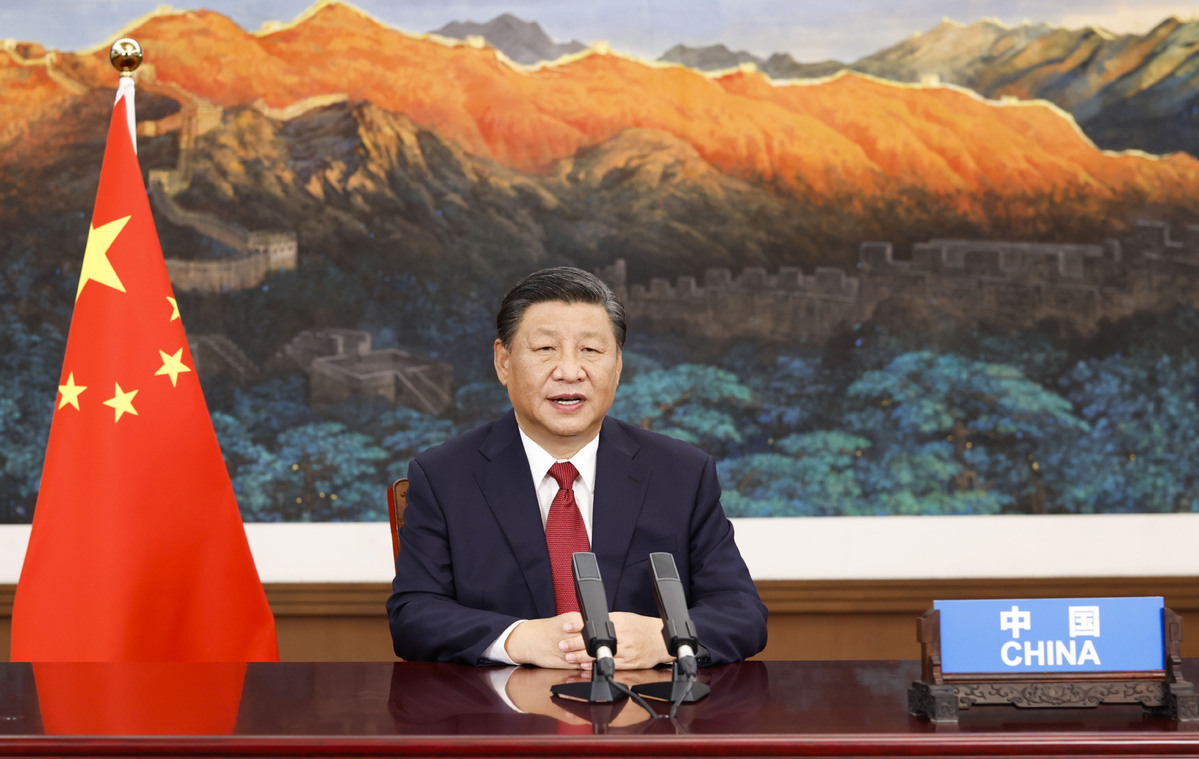President Xi Jinping addresses the general debate of the 76th session of the United Nations General Assembly via video on Sept 21, 2021. [Photo/Xinhua]
BEIJING - As people across the world ushered in 2022 with hopes that the COVID-19 pandemic would ultimately be over and that life would return to normal, the raging Omicron variant cast an even darker shadow over global economic recovery.
In the face of the challenges, the world might find inspiration and a viable path for progress from China's proposals and solutions put forth by President Xi Jinping on various occasions.
A solution to common challenges facing humanity is the Global Development Initiative (GDI) Xi proposed when addressing the general debate of the 76th session of the United Nations General Assembly in September 2021.
"Facing the severe shocks of COVID-19, we [countries across the world] need to work together to steer global development toward a new stage of balanced, coordinated and inclusive growth," Xi said. "To this end, I would like to propose a Global Development Initiative."
The initiative offers a practical guide to action -- staying committed to development as a priority, a people-centered approach, benefits for all, innovation-driven development, harmony between human and nature, and results-oriented actions.
In fact, these are exactly what China has gained from its endeavor of building a moderately prosperous society in all respects. With development as a tool, the ultimate purpose is to improve people's well-being and enable the people to achieve all-round development, which is the common inspiration of people regardless of their skin color, race and nationality.
Predictably, the implementation of the initiative might encounter obstructions from hegemonic developed economies. They have been snubbing international trends and developing countries' right to development, and putting their own national interests first. This has been proved by their protectionist and bullying actions under the garb of "multilateralism" over the past years.
Taking COVAX for example, the global initiative aimed at equitable access to COVID-19 vaccines is supposed to see countries uphold true multilateralism and pool resources to achieve mass vaccination globally.
In reality, the "immunity gap" is only widening as some countries delayed or even defaulted on their contributions to COVAX.
China, however, has been honoring its words. By the end of 2021, China had provided 2 billion doses of COVID-19 vaccines to more than 120 countries and international organizations, fulfilling a pledge it made to the world about five months ago at the first meeting of the International Forum on COVID-19 Vaccine Cooperation.
China sticks to its commitment despite the challenging task of vaccinating its 1.4 billion population. Its contribution accounts for one third of total vaccine doses administered across the world, except in China.
"We must improve global governance and practice true multilateralism," said Xi when proposing the GDI. True multilateralism should be the correct response to global issues amid a raging pandemic as well as in the post-pandemic era.
Be it for global development or the provision of public goods to the international community, China's dedication has its root in its vision of building a community with a shared future for humanity.
In a historic juncture where countries are struggling with unprecedented challenges, we all should ask ourselves a question: how should we humanity as a whole press ahead?
Xi's words at a national meeting honoring heroes in the fight against COVID-19 in 2020 are thought-provoking.
"Our history and experiences have shown that as long as all countries are committed to building a human community with a shared future, uphold multilateralism, and boost unity and cooperation, the people of the world will be able to meet whatever challenges we face and make this planet a beautiful home for all of us."



